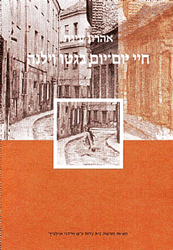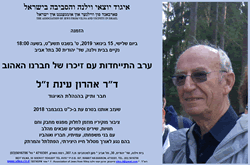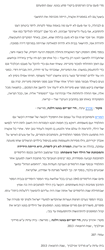The Story of Dr. Aharon Einat
A child survivor of Ghetto Vilna
-- From time to time the Germans made surprise visits to the ghetto. Their very appearance at the gate, not even in an Aktion, would have put the residents into panic, because we never knew what was going to happen. To be on the safe side we wanted to hide, even the owners of the "teeth" among us, let alone the "illegal" like my mother and grandmother. I remember there were quite a few misfortunes, and indeed, in one of the cases I insisted, to my mother's anxiety, to stay home and not go down to Malina, which was in the basement of a nearby apartment.
At the end of 1941, the succession of Aktions was halted and a relatively quiet period of eighteen months, which became apparent to the ghetto residents only in retrospect, continued throughout the time, with anxiety and fear. In time I started selling cigarettes. I did it both to ease our financial situation and to deal with something. The cigarettes I sold by unit would have smuggled my uncle. Like me, there were other "merchant" children, and a kind of "common bond" was created between us. I even had an unpleasant experience when an older boy deceived me and stole a pack of cigarettes from me. It happened that someone asked me for six cigarettes and did not know how to calculate the amount ... As a result of all this, my mother began to accompany me and gradually the "trade" passed to her. I apparently focused on my main hobby at that time - reading.
Source: Aharon Einat, Daily Life in the Vilna Ghetto, Moreshet - The Mordechai Anielewicz Memorial House
The teachers and educators took upon themselves the difficult task of maintaining contact with the student and his family. It was precisely in the closed ghetto walls that it was important to free the child's soul, to show him a different world and to plant hope for a better future. After each Aktion, the number of students was reduced, and the educators and teachers, despite their personal grief over the loss of their loved ones, displayed devotion and strength in caring for the survivors who experienced deep distress, panic or indifference. The teacher not only taught, she was the friend and mentor of the child and his family. As the situation stabilized, the studies entered a regular and orderly format, such as "in the good old days." Each educator monitored the student and, at the end of the school year, awarded certificates. "Summer vacation" lasted only two weeks, at the end of June. Thus, for example, S. Schmidt notes:
The end of the 1943 school year was held in all three primary schools and high school for a variety of reasons. The relationship between the child and the educators was so brave that at the beginning of the school year of that year they had to continue and "go up a grade" with him.
The schools held celebrations and rallies dedicated to Israel's festivals and commemorated the death days of writers, poets and teachers who perished in the ghetto. The performances of the children in the ghetto brought the audience of guests to the excitement and excitement to tears ..
Lt. Col. Dr. Aharon Einat z "l
His wife: Etti, his sons: Haim, Tomer and Ofer and their sons, his brother: Eliezer Einat and his family, Shai, Uri and Anat and their sons.
The funeral will take place on Thursday, 29.11.18, at 13.00, Cemetery Rehovot, the end of Gorodski Street. We meet at the entrance to the cemetery.
Sitting Shiva at 13 Smilansky Street, Rehovot, between 09.00 - 14.00, 16.00 - 21.00.
The staff of the IDF Pensioners Association (AR) mourning and mourning the family for the death of their loved one.
He served in the Engineering Corps and was a resident of Rehovot.
The members of the Academic College of Tel Aviv-Jaffa congratulate Prof. Haim Einat on the death of his father.


